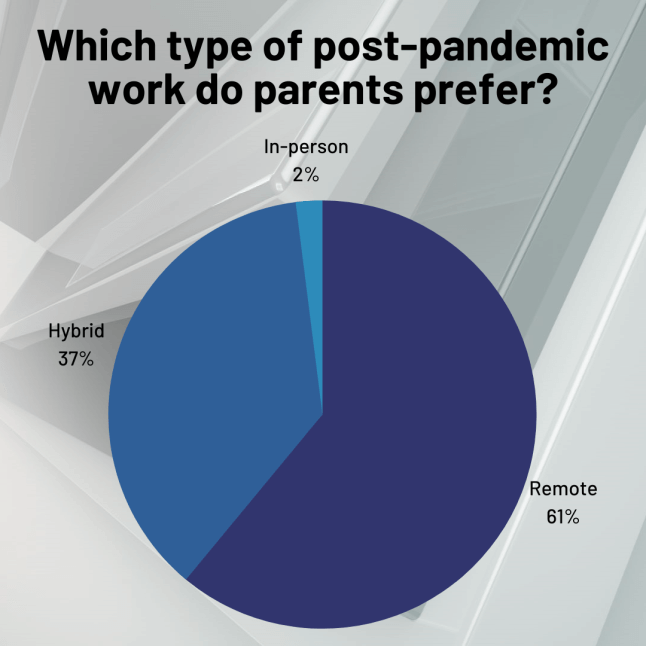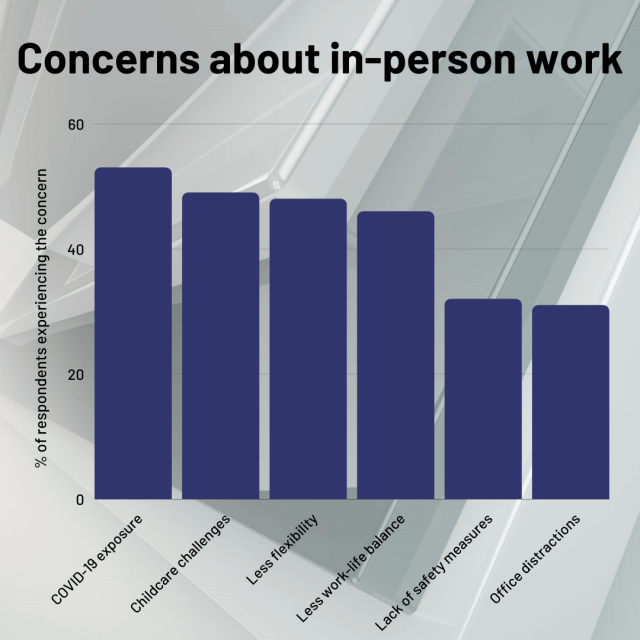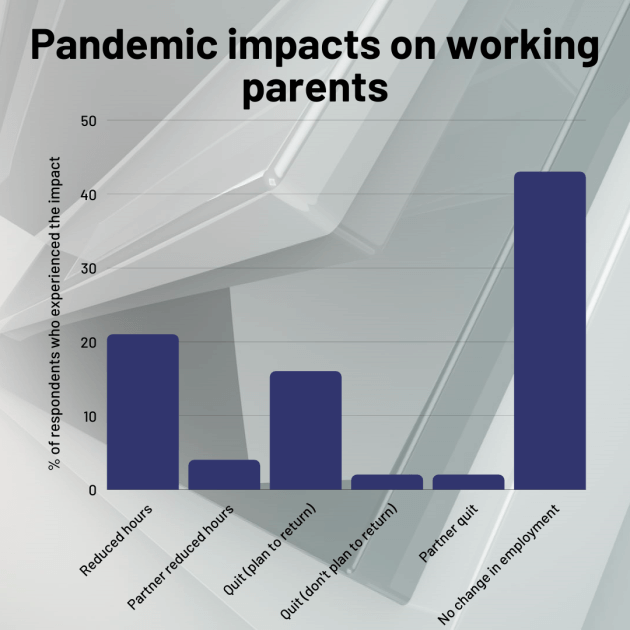(WHTM) — As COVID-19 restrictions are lifted and employees return to in-person work, parents may be reluctant to get back to pre-pandemic normal. According to a survey by FlexJobs, 61% of parents surveyed want to continue working remotely full-time after the pandemic, while 37% would prefer a hybrid work environment, and just 2% want to go back to the office full-time.

“Even though the pandemic for a lot of parents was really difficult and probably some of the harder parenting times that they’ve had…there still was this sense of having more control over their days,” Brie Reynolds, career development manager at FlexJobs, said.
Control and flexibility seem to be two of the biggest benefits of working from home for parents. Katrina Blaydon works for the Penn State College of Medicine and has a 6-year-old daughter.
Blaydon writes, “If my daughter is sick and needs a day of rest on the couch, I can work there too. If I don’t have child care, I can work from home to supervise her and still get my work done.”
Blaydon works remotely four days a week and in-person one day a week, although that could change in the future. “I hope that schedule is allowed to continue for the long term,” Blaydon writes.
In conducting the survey, Reynolds heard from parents who appreciated the flexibility to shift their work hours around to accommodate family needs while working from home. Better work-life balance was a benefit of remote work mentioned by 62% of surveyed parents, and 70% of respondents said they appreciated having more time with their families.
Blaydon also cites the importance of work-life balance, writing, “I love working from home [because] it allows me a little more work/home life balance. I don’t always need to choose work or home.”
Parents also noted other benefits of working from home, including no commute, improved work efficiency, more time for self-care (eating healthier, exercising, etc.), fewer office distractions, easier pet care, and of course avoiding exposure to COVID-19.
Among the cost and time savings benefits of working from home, parents — and especially women, notes Reynolds — also indicated that they spent less time and effort getting ready to go to work.
According to the FlexJobs survey, 62% of parents say they would quit their current job if they cannot continue remote work. Their concerns about returning to the office include challenges with childcare as well as reduced flexibility and work-life balance.

While parents experienced several benefits of working from home, they also faced challenges caring for children while working.
“You’re really trying to manage two very important tasks at once: you’re trying to keep your kids active and engaged in whatever they need to be doing and also keep yourself active and engaged in what you’re doing,” Reynolds said.
Reynolds has two kids who are 8 and 2, and she says that she and her husband were able to work from home and have flexible schedules, which made taking care of their kids during the pandemic much easier. At the same time, though, “Physically it kind of felt like my brain was trying to split into two pieces and do two separate things,” she said.
COVID-19 reduced working parents’ options for childcare. Schools went remote and childcare facilities closed. On top of that, individuals were encouraged to limit their contact with people outside their households, so friends and family who might normally be able to help supervise children were often unable to help during the pandemic.
The end of the pandemic will mean the return of these childcare options and other daytime activities for kids, and Reynolds says that having some kind of childcare support is very important for working parents.
Other remote work challenges parents noted in the FlexJobs survey include difficulty “unplugging” outside of the workday, technology problems, video meeting fatigue, and struggling to collaborate and manage relationships with colleagues.
Many people lost or quit their jobs during the pandemic. According to FlexJobs, “the majority [of parents] were impacted in some way due to childcare responsibilities.”
tus nec ullamcorper mattis, pulvinar dapibus leo.

Now parents may be getting ready to head back to the office or rejoin the workforce, which can feel daunting.
“Parents can always think back to what they overcame in the last year and how big a challenge that was, and really understand that whatever happens, those challenges they can handle because they handled the most unexpected challenge,” Reynolds reminded them.
Reynolds says that in addition to remote work, flexible scheduling is another popular option for parents. Flexible scheduling means that employees may have the option to shift their hours to avoid rush hour traffic or to bank overtime hours and then work shorter days when needed.
“One of the biggest things that employers can do to help parents is think about flexible scheduling,” Reynolds said. “Having more control over your days in that way can be really helpful.”
For parents returning to the workforce or looking to land a permanently remote position, Reynolds encourages a resume update. First, they should add any skills they developed during the pandemic, such as time management or proficiency with communication and collaboration technology (Zoom, Google Drive, Microsoft Teams, etc.).
Additionally, individuals who were not working during COVID-19 should note the reason for their career gap on their resumes, Reynolds says. For example, they might write, “Due to the pandemic, I had to leave my position to do full-time caregiving,” she said. This lets employers know that there was a specific reason for any gap in work experience.
Reynolds encourages job seekers to be confident in their applications because employers went through the COVID-19 pandemic, too.
“Everybody experienced this in the last year…truly everyone has some experience going through the pandemic, and so if people are worried about coming back into the workforce, finding a job after having a gap on their resume, it’s kind of like the old rules don’t necessarily apply to this situation,” Reynolds said.
The FlexJobs survey had 1,184 respondents, all of whom have children 18 years old or younger living with them.
Author: Avery Van Etten
By ABC27




